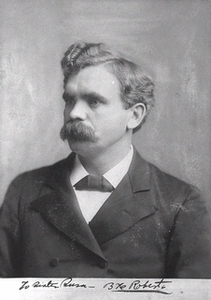ROBERTS, BRIGHAM HENRY

Brigham Henry Roberts
Brigham Henry Roberts was born in Warrington, Lancashire, England, in 1857. Roberts was left behind when his mother, a convert to Mormonism, migrated to Utah. A waif, he was taken in by friends. At the age of nine, he obtained passage across the ocean and walked across the plains to rejoin his mother in Utah. His childhood continued to be one of insecurity, hard work, and limited opportunity. During his teenage years he came close to following a downward path of dissoluteness, but he got hold of himself, attended meetings of the new local Mutual Improvement Association in Clearfield, and graduated from high school and later from the University of Deseret.
Roberts became active in the Mormon Church and practiced the principle of plural marriage. He married Sarah Louisa Smith in 1878, Celia Dibble in 1884, and Margaret Ship in 1890. In 1889 he served six months in prison for unlawful cohabitation.
Varied youthful work experience, especially as a blacksmith, was followed by employment as a schoolteacher and journalist, editing the Salt Lake Herald. But Roberts was primarily a churchman, serving as a missionary in Iowa, in the southern states, and in Great Britain. After 1888 he was a general authority--one of the First Council of the Seventy.
An eloquent speaker and writer, Roberts defended Mormonism and became the leading apologist of his generation. Examples of his writings are Succession in the Presidency, New Witness for God, and Defense of the Faith and the Saints.
Pugnacious and not easily cowed, Roberts gave a controversial speech at Utah's constitutional convention in 1895, unsuccessfully opposing female suffrage. He joined apostle Moses Thatcher in promoting the Democratic party and in running for elective office. In 1898 he ran again for a seat in Congress and easily won the election; but after an ugly media campaign and extensive committee hearings, he was refused his seat on the grounds of his practice of polygamy.
Roberts was a prolific if untrained historian. In addition to writing a biography of John Taylor and histories of the Missouri and Nauvoo periods of the LDS Church, he went on to complete a series of articles eventually published as the Comprehensive History of the Church of Jesus Christ of Latter-day Saints (1930). As assistant LDS Church Historian, he worked for several years on the primary source collection known as Joseph Smith's History of the Church of Jesus Christ of Latter-day Saints (six volumes, with a seventh volume on Brigham Young).
Roberts produced some of the most important Mormon theological works of his time, including a series of Seventy's yearbooks, The Mormon Doctrine of Deity, and an unpublished magnum opus, "The Truth, the Way, the Life." He died in 1933.
Disclaimer: Information on this site was converted from a hard cover book published by University of Utah Press in 1994. Any errors should be directed towards the University of Utah Press.